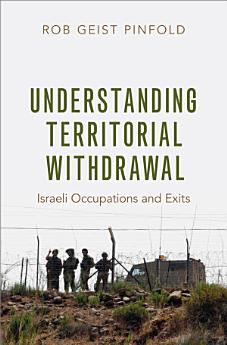Understanding Territorial Withdrawal: Israeli Occupations and Exits
Rob Geist Pinfold
maj 2023. · Oxford University Press
5,0star
1 recenzijareport
E-knjiga
345
Broj stranica
family_home
Prihvatljiva
info
reportOcjene i recenzije nisu potvrđene Saznajte više
O ovoj e-knjizi
From Ukraine to Afghanistan and beyond, occupations and exit dilemmas permeate contemporary geopolitics. However, the existing literature on territorial conflict rarely scrutinizes a pivotal, related question: what makes a state withdraw from an occupied territory, or entrench itself within it? In Understanding Territorial Withdrawal, Rob Geist Pinfold addresses this research gap. He focuses primarily on Israel, a unique but important milieu that offers pertinent lessons for other states facing similar policy problems. As Pinfold demonstrates, occupiers choose to either perpetuate or abandon an occupation because of three factors: their relations with the occupied, interactions with third parties, and the occupier's domestic politics. He argues that each withdrawal is the culmination of a gradual process of policy re-assessment. Critically, it is a combination of local violence and international pressure that causes popular and elite opinion within the occupier to endorse an exit, rather than perpetuate the status quo. To affirm this pattern, Pinfold constructs a generalizable framework for understanding territorial withdrawal. He then applies this framework to multiple case studies, which include: Israel's withdrawal from the Sinai Peninsula between 1974-1982; its "unilateral" withdrawal from southern Lebanon in 2000; and its "unilateral disengagement" from the Gaza Strip in 2005, as well as Israel's non-withdrawals from the West Bank and Golan Heights. Overall, Understanding Territorial Withdrawal delineates commonalities that manifested in each exit yet were absent in the cases of occupation without exit. A powerful analysis of a central concern for the study of international security, territorial conflict, and the Arab-Israel conflict alike, this book provides a critical intervention that identifies why occupiers either retain, or leave, occupied territory.
Ocjene i recenzije
5,0
1 recenzija
O autoru
Rob Geist Pinfold is a Research Fellow at the Peace Research Center Prague and a Lecturer in International Peace and Security at Durham University's School of Government and International Affairs. He is also a Research Fellow at the Centre for Grand Strategy at King's College London and a Senior Fellow at the Herzl Center for Israel Studies at Charles University in Prague. Rob holds a PhD in War Studies from King's College London. He is a scholar of international security whose research intersects the study of strategy and territorial conflict. A British-Israeli, he divides his time between the UK and Israel.
Ocijenite ovu e-knjigu
Recite nam šta mislite.
Informacije o čitanju
Pametni telefoni i tableti
Instalirajte aplikaciju Google Play Knjige za Android i iPad/iPhone uređaje. Aplikacija se automatski sinhronizira s vašim računom i omogućava vam čitanje na mreži ili van nje gdje god da se nalazite.
Laptopi i računari
Audio knjige koje su kupljene na Google Playu možete slušati pomoću web preglednika na vašem računaru.
Elektronički čitači i ostali uređaji
Da čitate na e-ink uređajima kao što su Kobo e-čitači, morat ćete preuzeti fajl i prenijeti ga na uređaj. Pratite detaljne upute Centra za pomoć da prenesete fajlove na podržane e-čitače.




